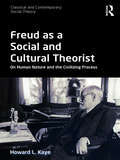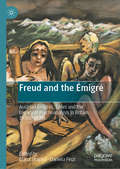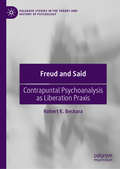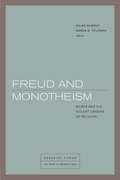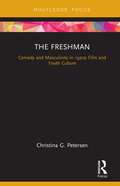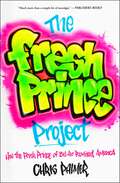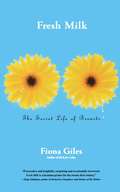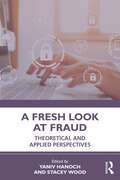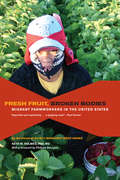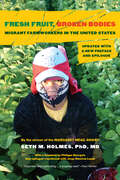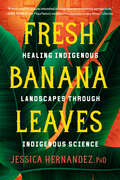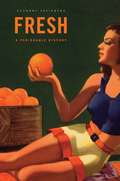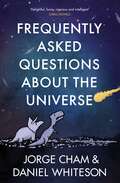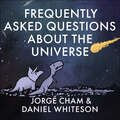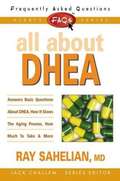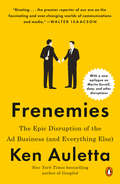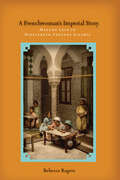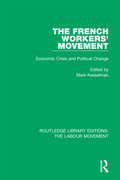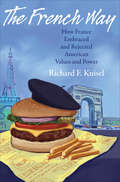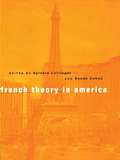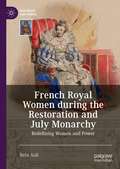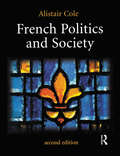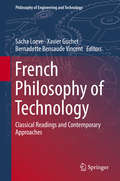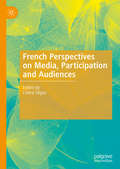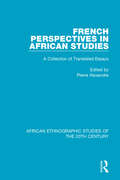- Table View
- List View
Freud as a Social and Cultural Theorist: On Human Nature and the Civilizing Process (Classical and Contemporary Social Theory)
by Howard L. KayeThis book offers a new account of Freud’s work by reading him as the social theorist and philosopher he always aspired to be, and not as the medical scientist he publicly claimed to be. In doing so, the author demonstrates that’s Freud’s social, moral, and cultural thought constitutes the core of his life’s work as a theorist, and is the thread that binds his voluminous writings together: from his earliest essays on the neuroses, to his foundational writings on dreams and sexuality, and to his far-ranging reflections on art, religion, and the dynamics of culture. Returning to the fundamental questions and concerns that animate Freud’s work - the nature of evil; the origins of religion, morality, and tradition; and the looming threat of resurgent barbarism - Freud as a Social and Cultural Theorist provides the first systematic re-examination of Freud’s social and cultural thought in more than a generation. As such, it will be of interest to social and cultural theorists, social philosophers, intellectual and cultural historians, and those with interests in psychoanalysis and its origins.
Freud and the Émigré: Austrian Émigrés, Exiles and the Legacy of Psychoanalysis in Britain, 1930s–1970s
by Elana Shapira Daniela FinziThis book reconsiders standard narratives regarding Austrian émigrés and exiles to Britain by addressing the seminal role of Sigmund Freud and his writings, and the critical part played by his contemporaries, in the construction of a method promoting humanized relations between individual and society and subjectivity and culture. This anthology presents groundbreaking examples of the manners in which well-known personalities including psychoanalysts Anna Freud and Ernst Kris, sociologist Marie Jahoda, authors Stefan Zweig and Hilde Spiel, film director Berthold Viertel, architect Ernst Freud, and artist Oskar Kokoschka, achieved a greater impact, and contributed to the broadening of British and global cultures, through constructing a psychologically effective language and activating their émigré networks. They advanced a visionary Viennese tradition through political and social engagements and through promoting humanistic perspectives in their scientific, educational and artistic works.
Freud and Said: Contrapuntal Psychoanalysis as Liberation Praxis (Palgrave Studies in the Theory and History of Psychology)
by Robert K. BesharaThis book examines the theoretical links between Edward W. Said and Sigmund Freud as well the relationship between psychoanalysis, postcolonialism and decoloniality more broadly. The author begins by offering a comprehensive review of the literature on psychoanalysis and postcolonialism, which is contextualized within the apparatus of racialized capitalism. In the close analysis of the interconnections between the Freud and Said that follows, there is an attempt to decolonize the former and psychoanalyze the latter. He argues that decolonizing Freud does not mean canceling him; rather, he employs Freud’s sharpest insights for our time, by extending his critique of modernity to coloniality. It is also advanced that psychoanalyzing Said does not mean psychologizing the man; instead the book's aim is to demonstrate the influence of psychoanalysis on Said’s work. It is asserted that Said began with Freud, repressed him, and then Freud returned. Reading Freud and Said side by side allows for the theorization of what the author calls contrapuntal psychoanalysis as liberation praxis, which is discussed in-depth in the final chapters.This book, which builds on the author’s previous work, Decolonial Psychoanalysis, will be a valuable text to scholars and students from across the psychology discipline with an interest in Freud, Said and the broader relationship between psychoanalysis and colonialism.
Freud and Monotheism: Moses and the Violent Origins of Religion (Berkeley Forum in the Humanities)
by Richard Bernstein Ronald Hendel Jan Assmann Catherine Malabou Gabriele Schwab Joel Whitebook Willi Goetschel Karen S. Feldman Gilad Sharvit Yael SegalovitzOver the last few decades, vibrant debates regarding post-secularism have found inspiration and provocation in the works of Sigmund Freud. <P><P>A new interest in the interconnection of psychoanalysis, religion and political theory has emerged, allowing Freud’s illuminating examination of the religious and mystical practices in “Obsessive Neurosis and Religious Practices,” and the exegesis of the origins of ethics in religion in Totem and Taboo, to gain currency in recent debates on modernity. In that context, the pivotal role of Freud’s masterpiece, Moses and Monotheism, is widely recognized. <P>Freud and Monotheism brings together fundamental new contributions to discourses on Freud and Moses, as well as new research at the intersections of theology, political theory, and history in Freud’s psychoanalytic work. Highlighting the broad impact of Moses and Monotheism across the humanities, the contributors hail from such diverse disciplines as philosophy, comparative literature, cultural studies, German studies, Jewish studies and psychoanalysis. <P><P>Jan Assmann and Richard Bernstein, whose books pioneered the earlier debate that initiated the Freud and Moses discourse, seize the opportunity to revisit and revise their groundbreaking work. Gabriele Schwab, Gilad Sharvit, Karen Feldman, and Yael Segalovitz engage with the idiosyncratic, eccentric and fertile nature of the book as a Spӓtstil, and explore radical interpretations of Freud’s literary practice, theory of religion and therapeutic practice. <P>Ronald Hendel offers an alternative history for the Mosaic discourse within the biblical text, Catherine Malabou reconnects Freud’s theory of psychic phylogenesis in Moses and Monotheism to new findings in modern biology and Willi Goetschel relocates Freud in the tradition of works on history that begins with Heine, while Joel Whitebook offers important criticisms of Freud’s main argument about the advance in intellectuality that Freud attributes to Judaism.
The Freshman: Comedy and Masculinity in 1920s Film and Youth Culture (Cinema and Youth Cultures)
by Christina G. PetersenBefore the advent of the teenager in the 1940s and the teenpic in the 1950s, The Freshman (Taylor and Newmeyer, 1925) represented 1920s college youth culture as an exclusive world of leisure to a mass audience. Starring popular slapstick comedian Harold Lloyd, The Freshman was a hit with audiences for its parody of contemporary conceptions of university life as an orgy of proms and football games, becoming the highest grossing comedy feature of the silent era. This book examines The Freshman from a number of perspectives, with a focus on the social, economic, and political context that led to the rise of campus culture as a distinct subculture and popular mass culture in 1920s America; Lloyd’s use of slapstick to represent an embodied, youthful middle-class masculinity; and the film’s self-reflexive exploration of the conflict between individuality and conformity as an early entry in the youth film genre.
The Fresh Prince Project: How the Fresh Prince of Bel-Air Remixed America
by Chris PalmerA &“thorough, thoughtful, and immensely entertaining&” (Jemele Hill, author of Uphill) cultural history of the beloved nineties sitcom that launched Will Smith to superstardom—The Fresh Prince of Bel-Air—in the vein of Seinfeldia and Best Wishes, Warmest Regards.More than thirty years have passed since The Fresh Prince of Bel-Air premiered on NBC but unlike other family sitcoms of its era, it has remained culturally relevant and beloved by new generations of fans. With fresh eyes on the show in the wake of 2022&’s launch of Bel-Air, a Fresh Prince reboot on NBC&’s Peacock, The Fresh Prince Project brings us never-before-told stories based on exclusive interviews with the show&’s cast, creators, writers, and crew. The Fresh Prince Project is an eye-opening exploration and celebration of a show that not only made Will Smith a household name but helped redefine America&’s understandings of race, sex, parenthood, and class.
Fresh Milk: The Secret Life of Breasts
by Fiona GilesWhile countless breastfeeding guides crowd bookshelves, not one of them speaks to women with anything approaching bestselling author Fiona Giles's level of intimacy and vitality. In Fresh Milk, through a provocative collection of stories, memories, and personal accounts, Giles uncovers the myths and truths of the lactating breast. From the young mother grappling with the bewildering trappings of maternity wear to the woman who finds herself surprisingly aroused by new sensations, and the modern dad who learns the ins and outs of breastfeeding, the portraits in Giles's eye-opening book offer a funny, wise, and comforting resource for women -- and even their friends and partners who have had, or expect, intimate experiences with the pleasures and pain of lactation. By turns poignant and informative, sexy and witty, empathic and empowering, Fresh Milk delivers everything we wanted to know about breastfeeding that our mothers never told us.
A Fresh Look at Fraud: Theoretical and Applied Perspectives
by Yaniv Hanoch Stacey WoodA Fresh Look at Fraud features psychologists, criminologists, and computer scientists to address the state-of-the-art research on the rising problem of fraud, scams, and financial abuse, stimulating a cross-disciplinary exchange of ideas, theories, methods, and practices. In this timely volume, Yaniv Hanoch and Stacey Wood bring together leading international researchers to discuss and review state-of-the-art research in fraud research, adopting diverse methodologies (from experimental to neuroimaging), perspectives, and questions. The book addresses topics such as mass marketing fraud, financial exploitation, ageing and cyber fraud, risk factors associated with becoming a fraud victim and online/cryptocurrency fraud. It offers a holistic picture of emerging trends and issues in fraud research and also includes discussion of the ‘Next Frontiers’ in research and important insights on how to create solutions. This book will be a crucial read for practitioners and researchers engaged in fraud research and other fields such as Forensic Psychology, Social Psychology, Criminal Behavior, and Criminology, as well as for postgraduates training in these fields.
Fresh Fruit, Broken Bodies
by Seth HolmesThis book is an ethnographic witness to the everyday lives and suffering of Mexican migrants. Based on 5 years of research in the field (including berry-picking and traveling with migrants back and forth from Oaxaca up the West Coast), Holmes, an anthropologist and MD in the mold of Paul Farmer and Didier Fassin, uncovers how market forces, anti-immigrant sentiment, and racism undermine health and health care. Holmes' material is visceral and powerful--for instance, he trekked with his informants illegally through the desert border into Arizona, where they were apprehended and jailed by the Border Patrol. After he was released from jail (and his companions were deported back to Mexico), Holmes interviewed Border Patrol agents, local residents and armed vigilantes in the borderlands. He lived with indigenous Mexican families in the mountains of Oaxaca and in farm labor camps in the United States, planted and harvested corn, picked strawberries, accompanied sick workers to clinics and hospitals, participated in healing rituals, and mourned at funerals for friends. The result is a 'thick description' that conveys the full measure of struggle, suffering and resilience of these farmworkers.
Fresh Fruit, Broken Bodies: Migrant Farmworkers in the United States, Updated with a New Preface and Epilogue (California Series in Public Anthropology #27)
by Seth M. HolmesFresh Fruit, Broken Bodies provides an intimate examination of the everyday lives, suffering, and resistance of Mexican migrants in our contemporary food system. Seth Holmes, an anthropologist and MD in the mold of Paul Farmer and Didier Fassin, shows how market forces, anti-immigrant sentiment, and racism undermine health and health care. Holmes was invited to trek with his companions clandestinely through the desert into Arizona and was jailed with them before they were deported. He lived with Indigenous families in the mountains of Oaxaca and in farm labor camps in the United States, planted and harvested corn, picked strawberries, and accompanied sick workers to clinics and hospitals. This "embodied anthropology" deepens our theoretical understanding of the ways in which social inequities come to be perceived as normal and natural in society and in health care. In a substantive new epilogue, Holmes and Indigenous Oaxacan scholar Jorge Ramirez-Lopez provide a current examination of the challenges facing farmworkers and the lives and resistance of the protagonists featured in the book.
Fresh Banana Leaves: Healing Indigenous Landscapes through Indigenous Science
by Jessica HernandezAn Indigenous environmental scientist breaks down why western conservationism isn't working--and offers Indigenous models informed by case studies, personal stories, and family histories that center the voices of Latin American women and land protectors.Despite the undeniable fact that Indigenous communities are among the most affected by climate devastation, Indigenous science is nowhere to be found in mainstream environmental policy or discourse. And while holistic land, water, and forest management practices born from millennia of Indigenous knowledge systems have much to teach all of us, Indigenous science has long been ignored, otherized, or perceived as "soft"--the product of a systematic, centuries-long campaign of racism, colonialism, extractive capitalism, and delegitimization. Here, Jessica Hernandez--Maya Ch'orti' and Zapotec environmental scientist and founder of environmental agency Piña Soul--introduces and contextualizes Indigenous environmental knowledge and proposes a vision of land stewardship that heals rather than displaces, that generates rather than destroys. She breaks down the failures of western-defined conservatism and shares alternatives, citing the restoration work of urban Indigenous people in Seattle; her family's fight against ecoterrorism in Latin America; and holistic land management approaches of Indigenous groups across the continent. Through case studies, historical overviews, and stories that center the voices and lived experiences of Indigenous Latin American women and land protectors, Hernandez makes the case that if we're to recover the health of our planet--for everyone--we need to stop the eco-colonialism ravaging Indigenous lands and restore our relationship with Earth to one of harmony and respect.
Fresh: A Perishable History
by Susanne FreidbergThat rosy tomato perched on your plate in December is at the end of a great journey—not just over land and sea, but across a vast and varied cultural history. This is the territory charted in Fresh. Opening the door of an ordinary refrigerator, it tells the curious story of the quality stored inside: freshness. We want fresh foods to keep us healthy, and to connect us to nature and community. We also want them convenient, pretty, and cheap. Fresh traces our paradoxical hunger to its roots in the rise of mass consumption, when freshness seemed both proof of and an antidote to progress. Susanne Freidberg begins with refrigeration, a trend as controversial at the turn of the twentieth century as genetically modified crops are today. Consumers blamed cold storage for high prices and rotten eggs but, ultimately, aggressive marketing, advances in technology, and new ideas about health and hygiene overcame this distrust. Freidberg then takes six common foods from the refrigerator to discover what each has to say about our notions of freshness. Fruit, for instance, shows why beauty trumped taste at a surprisingly early date. In the case of fish, we see how the value of a living, quivering catch has ironically hastened the death of species. And of all supermarket staples, why has milk remained the most stubbornly local? Local livelihoods; global trade; the politics of taste, community, and environmental change: all enter into this lively, surprising, yet sobering tale about the nature and cost of our hunger for freshness.
Frequently Asked Questions About the Universe
by Daniel Whiteson Jorge ChamYou've got questions: about space, time, gravity, and the odds of meeting your older self inside a wormhole. All the answers you need are right here.As a species, we may not agree on much, but one thing brings us all together: a need to know. We all wonder, and deep down we all have the same big questions. Why can't I travel back in time? Where did the universe come from? What's inside a black hole? Can I rearrange the particles in my cat and turn it into a dog?Physics professor Daniel Whiteson and researcher-turned-cartoonist Jorge Cham are experts at explaining science in ways we can all understand, in their books and on their popular podcast, Daniel and Jorge Explain the Universe. With their signature blend of humour and oh-now-I-get-it clarity, Jorge and Daniel offer short, accessible, and lighthearted answers to some of the most common, most outrageous, and most profound questions about the universe they've been asked.This witty, entertaining, and fully illustrated book is an essential troubleshooting guide for the perplexing aspects of reality, big and small, from the invisible particles that make up your body to the identical version of you currently reading this exact sentence in the corner of some other galaxy. If the universe came with an FAQ, this would be it.
Frequently Asked Questions About the Universe
by Daniel Whiteson Jorge ChamAn eminent physicist at CERN and the cartoonist behind the hugely successful PhD Comics answer the most important, most outrageous and funniest questions about everything.You've got questions: about space, time, gravity, and the odds of meeting your older self inside a wormhole. All the answers you need are right here.As a species, we may not agree on much, but one thing brings us all together: a need to know. We all wonder, and deep down we all have the same big questions. Why can't I travel back in time? Where did the universe come from? What's inside a black hole? Can I rearrange the particles in my cat and turn it into a dog?Physics professor Daniel Whiteson and researcher-turned-cartoonist Jorge Cham are experts at explaining science in ways we can all understand, in their books and on their popular podcast, Daniel and Jorge Explain the Universe. With their signature blend of humour and oh-now-I-get-it clarity, Jorge and Daniel offer short, accessible, and lighthearted answers to some of the most common, most outrageous, and most profound questions about the universe they've been asked.This witty and entertaining audiobook is an essential troubleshooting guide for the perplexing aspects of reality, big and small, from the invisible particles that make up your body to the identical version of you currently reading this exact sentence in the corner of some other galaxy. If the universe came with an FAQ, this would be it.(P) 2021 Hodder & Stoughton Limited
Frequently Asked Questions: All About DHEA
by Ray SahelianThis book is about the potential benefits and side effects of the hormone DHEA
Frenemies: The Epic Disruption of the Ad Business (and Everything Else)
by Ken AulettaAn intimate and profound reckoning with the changes buffeting the $2 trillion global advertising and marketing business from the perspective of its most powerful players, by the bestselling author of GoogledAdvertising and marketing touches on every corner of our lives, and is the invisible fuel powering almost all media. Complain about it though we might, without it the world would be a darker place. And of all the industries wracked by change in the digital age, few have been turned on its head as dramatically as this one has. We are a long way from the days of Don Draper; as Mad Men is turned into Math Men (and women--though too few), as an instinctual art is transformed into a science, the old lions and their kingdoms are feeling real fear, however bravely they might roar. Frenemies is Ken Auletta's reckoning with an industry under existential assault. He enters the rooms of the ad world's most important players, some of them business partners, some adversaries, many "frenemies," a term whose ubiquitous use in this industry reveals the level of anxiety, as former allies become competitors, and accusations of kickbacks and corruption swirl. We meet the old guard, including Sir Martin Sorrell, the legendary head of WPP, the world's largest ad agency holding company; while others play nice with Facebook and Google, he rants, some say Lear-like, out on the heath. There is Irwin Gotlieb, maestro of the media agency GroupM, the most powerful media agency, but like all media agencies it is staring into the headlights as ad buying is more and more done by machine in the age of Oracle and IBM. We see the world from the vantage of its new powers, like Carolyn Everson, Facebook's head of Sales, and other brash and scrappy creatives who are driving change, as millennials and others who disdain ads as an interruption employ technology to zap them. We also peer into the future, looking at what is replacing traditional advertising. And throughout we follow the industry's peerless matchmaker, Michael Kassan, whose company, MediaLink, connects all these players together, serving as the industry's foremost power broker, a position which feasts on times of fear and change. Frenemies is essential reading, not simply because of what it says about this world, but because of the potential consequences: the survival of media as we know it depends on the money generated by advertising and marketing--revenue that is in peril in the face of technological changes and the fraying trust between the industry's key players.
A Frenchwoman's Imperial Story: Madame Luce in Nineteenth-Century Algeria
by Rebecca RogersEugénie Luce was a French schoolteacher who fled her husband and abandoned her family, migrating to Algeria in the early 1830s. By the mid-1840s she had become a major figure in debates around educational policies, insisting that women were a critical dimension of the French effort to effect a fusion of the races. To aid this fusion, she founded the first French school for Muslim girls in Algiers in 1845, which thrived until authorities cut off her funding in 1861. At this point, she switched from teaching spelling, grammar, and sewing, to embroidery—an endeavor that attracted the attention of prominent British feminists and gave her school a celebrated reputation for generations. The portrait of this remarkable woman reveals the role of women and girls in the imperial projects of the time and sheds light on why they have disappeared from the historical record since then.
The French Workers' Movement: Economic Crisis and Political Change (Routledge Library Editions: The Labour Movement #21)
by Mark KesselmanFirst published in 1984. This volume brings together many of the foremost French and North American specialists on the French working class movement. Although they differ substantially in their theoretical and ideological orientation, they share a left perspective. Their original essays provide a coherent and comprehensive analysis of the history of the movement, focusing on the constraints and opportunities created by the economic crisis of the 1970s and the political change ushered in by the Socialist Party’s victory in 1981.
The French Way
by Richard F. KuiselThere are over 1,000 McDonald's on French soil. Two Disney theme parks have opened near Paris in the last two decades. And American-inspired vocabulary such as "le weekend" has been absorbed into the French language. But as former French president Jacques Chirac put it: "The U.S. finds France unbearably pretentious. And we find the U.S. unbearably hegemonic." Are the French fascinated or threatened by America? They Americanize yet are notorious for expressions of anti-Americanism. From McDonald's and Coca-Cola to free markets and foreign policy, this book looks closely at the conflicts and contradictions of France's relationship to American politics and culture. Richard Kuisel shows how the French have used America as both yardstick and foil to measure their own distinct national identity. They ask: how can we be modern like the Americans without becoming like them? France has charted its own path: it has welcomed America's products but rejected American policies; assailed America's "jungle capitalism" while liberalizing its own economy; attacked "Reaganomics'" while defending French social security; and protected French cinema, television, food, and language even while ingesting American pop culture. Kuisel examines France's role as an independent ally of the United States--in the reunification of Germany and in military involvement in the Persian Gulf and Bosnia--but he also considers the country's failures in influencing the Reagan, Bush, and Clinton administrations. Whether investigating France's successful information technology sector or its spurning of American expertise during the AIDS epidemic, Kuisel asks if this insistence on a French way represents a growing distance between Europe and the United States or a reaction to American globalization. Exploring cultural trends, values, public opinion, and political reality, The French Way delves into the complex relationship between two modern nations.
French Theory in America
by Sylvère Lotringer Sande CohenWhat does it mean to"do theory" in America? In what ways has "French Theory" changed American intellectual and artistic life? How different is it from what French intellectuals themselves conceived, and what does all this tell us about American intellectual life? Is "French Theory" still a significant force in America, raising conceptual questions not easily answered? In this volume of new work--including the French writers Julia Kristeva, Jacques Derrida, Jean Baudrillard, and Gilled Delezue, as well as essays by Sylvere Lotringer and Sande Cohen, Mario Biagoli, Elie During, Chris Kraus, Alison Gingeras, and Kriss Ravetto, among others--French theorists assess the impact and reception of their work in America, and American-based critics account for their effects in different areas of cultural criticism and art over the last thirty years.
French Royal Women during the Restoration and July Monarchy: Redefining Women and Power (Queenship and Power)
by Heta AaliThis book examines public discussions around France's four most prominent royal women during the first and second Restoration and July Monarchy: the duchesse d’Angoulême, the duchesse de Berry, Queen of the French Marie-Amélie, and Adélaïde d’Orléans. These were the most powerful women of the last decades of the French monarchy, but the new roles women were assigned in post-revolutionary France did not permit them to openly exercise political influence. This book explores continuities and variations in narratives of royal legitimacy, and how historians, authors, and politicians used national history - particularly medieval and early modern history - to either legitimize or undermine the French monarchy, and to define women's social and political roles.
French Politics and Society
by Alistair ColeAssuming no previous knowledge and concentrating on the post-1981 era, this book introduces the fundamentals of French government and society. Covering a broad spectrum of topics, French Politics and Society 2nd Edition follows a logical structure and framework for analysis, providing an excellent description of French institutions, access to background information and discussions of historical developments, political forces, public policy, and the evolution of important aspects of French society.
French Philosophy of Technology: Classical Readings And Contemporary Approaches (Philosophy Of Engineering And Technology Ser. #29)
by Bernadette Bensaude Vincent Xavier Guchet Sacha LoeveOffering an overall insight into the French tradition of philosophy of technology, this volume is meant to make French-speaking contributions more accessible to the international philosophical community. The first section, “Negotiating a Cultural Heritage,” presents a number of leading 20th century philosophical figures (from Bergson and Canguilhem to Simondon, Dagognet or Ellul) and intellectual movements (from Personalism to French Cybernetics and political ecology) that help shape philosophy of technology in the Francophone area, and feed into contemporary debates (ecology of technology, politics of technology, game studies). The second section, “Coining and Reconfiguring Technoscience,” traces the genealogy of this controversial concept and discusses its meanings and relevance. A third section, “Revisiting Anthropological Categories,” focuses on the relationships of technology with the natural and the human worlds from various perspectives that include anthropotechnology, Anthropocene, technological and vital norms and temporalities. The final section, “Innovating in Ethics, Design and Aesthetics,” brings together contributions that draw on various French traditions to afford fresh insights on ethics of technology, philosophy of design, techno-aesthetics and digital studies. The contributions in this volume are vivid and rich in original approaches that can spur exchanges and debates with other philosophical traditions.
French Perspectives on Media, Participation and Audiences
by Céline SégurThis book provides a theoretical assessment of audience research issues. A host of contributions from French-speaking scholars question and analyse the participatory turn in media and communication research that has emerged over the last 15 years. This collection brings together high-quality theoretical and empirical contributions in order to promote scientific discussions and debates between English- and French-speaking academics. Ségur contextualizes the paradigmatic evolution of media communication, explaining how participation has become an imperative in media devices. In the first section authors explore, often critically, types of participatory media formats such as radio, television, and the internet. In the second section, authors focus on the participatory performances of audiences in public media spaces. Analysis is made of online forums, the phenomenon of lurking, and of urban spaces. This book provides viewpoints from a range of disciplines including social anthropology, information and communication sciences, and media studies.
French Perspectives in African Studies: A Collection of Translated Essays
by Pierre AlexandreOriginally published in 1973, this volume presents some of the main approaches that were developed by French Africanists during the 1940s, 50s and 60s. The book covers social structure, kinship systems, economic change, ethnography, language, history and archaeology in West Africa.
